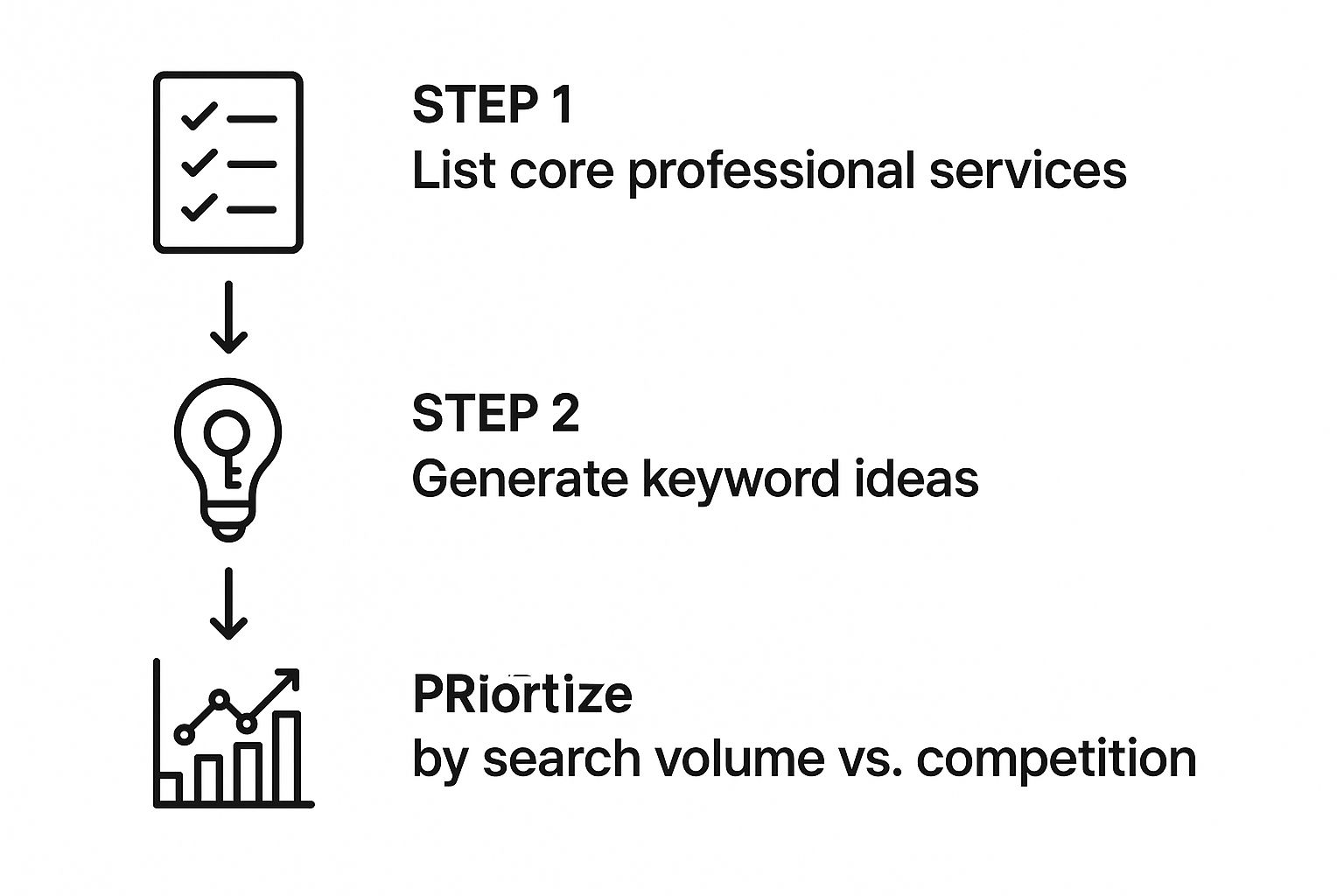When we talk about SEO for professional services firms, we're really talking about a direct line to high-value clients who are already looking for what you do. This isn't just another marketing tactic; it's a powerful business development engine. For any firm where trust and credibility are the currency of the realm, a smart SEO strategy is absolutely vital for growth.
Why SEO Is Your Firm's Strongest Growth Lever

It's time to stop thinking of SEO as a box to check on your marketing to-do list. For professional services—whether you're a law firm, a financial advisor, or a management consultant—it’s the core of modern business development. The hard truth is that word-of-mouth referrals aren't enough anymore. A potential client’s journey almost always starts with a search engine.
Think about it. When a CFO needs to find a new audit firm or a high-net-worth individual is looking for wealth management advice, their first stop is Google. They conduct serious due diligence online, vetting potential partners long before they ever make a call. Your firm’s visibility in that critical moment is non-negotiable.
Connecting with High-Intent Clients
Unlike traditional ads that interrupt someone's day, SEO gets you in front of prospects at the exact moment they need you. This intent-driven approach is what makes SEO for professional services firms so incredibly effective. It's the difference between a cold call and a potential client walking through your door asking for your specific expertise.
A well-executed strategy delivers clear, bottom-line results:
- Boosted Visibility: Ranking for the right keywords puts your firm in front of an audience actively searching for your services.
- Instant Credibility: A high search ranking is like a powerful third-party endorsement. People naturally trust businesses that Google puts at the top.
- Higher Quality Leads: SEO attracts prospects who have already defined their problem, which means the leads are far more qualified than those from most outbound efforts.
- A Sustainable Growth Engine: Once you have a strong SEO foundation, you've built a lasting digital asset that consistently brings in new inquiries, making you less reliant on expensive advertising.
Your firm’s expertise is your greatest asset. SEO is what turns that expertise into a tangible, measurable stream of new business by making sure you’re the trusted authority clients find first.
The Unique Challenge for Professional Services
For firms in high-trust industries, the stakes are just higher. A potential client isn't just buying a one-off product; they're starting a long-term relationship built on confidence and proven experience. Your entire online presence has to reflect that.
Every blog post, every service page, and every local business listing is a piece of a larger puzzle that builds that initial layer of trust. This is exactly why a generic, cookie-cutter SEO approach will always fail. Your strategy has to be carefully designed to demonstrate authority, showcase your team's experience, and build credibility from the very first click. It’s about more than just ranking for keywords—it's about building a digital footprint that reassures clients they've found the right partner.
Auditing Your Firm's SEO Foundation
Before you can build a powerful growth engine, you need a clear picture of where you’re starting from. An SEO audit gives you that blueprint—an honest look at your firm's digital health. It’s all about figuring out what’s working, what’s broken, and where your biggest opportunities are hiding. Think of it as the initial diagnostic before you write the prescription.
A solid audit for a professional services firm isn't just a technical checklist. It's a strategic deep dive into three core areas. If you ignore any one of them, your whole effort to attract high-value clients can fall flat.
Assessing Your Technical Performance
The first place I always look is the technical foundation of a website. You could have the most brilliant thought leadership on the planet, but if your site is slow, insecure, or a maze for search engines, potential clients will never find it. These issues are often invisible to the average person, but they can absolutely tank your rankings.
Start by checking these critical elements:
- Page Speed: How fast do your pages load? A delay of just a few seconds is enough to make a potential client click away. Use a tool to check your Core Web Vitals.
- Mobile Usability: A huge chunk of your prospects, including C-suite executives on the go, will land on your site from a phone. Your website has to deliver a flawless experience on every screen size.
- Site Security: This is non-negotiable. Checking your site's security is a must. A secure site often comes down to understanding what an SSL certificate is and why it’s so important for both SEO and building trust.
A fantastic—and free—tool for this initial health check is Google Search Console. It's your direct line to Google, and it will flag many of these foundational problems for you.
Here's a peek at the Performance report, which shows you clicks, impressions, and your site's average position in search results.

This dashboard gives you a great high-level view of your organic visibility, helping you spot trends and see which pages are getting the most traction.
Evaluating On-Page Content Relevance
Next, you need to put your key service pages and articles under the microscope. This part of the audit is all about making sure your message actually lines up with what potential clients are searching for. You have to speak their language, not just your own internal industry jargon.
For a law firm, this means looking at a page on "Mergers & Acquisitions Law" and asking, "Does this answer real questions about due diligence, deal structuring, or regulatory compliance?" It's not enough to just say you offer the service. You have to prove your expertise by tackling the client's specific problems right there in the content. That’s how you build relevance and trust from the very first click.
You can learn more by checking out our guide to https://copymasters.co/blog/improving-search-engine-rankings.
A proper SEO audit reveals the gap between the expertise you have and the expertise you’re showing. Closing that gap is where you’ll find your most significant growth opportunities.
Analyzing Your Backlink Authority
Finally, no audit is complete without looking at your backlink profile—the collection of other websites linking to yours. In the professional services world, think of backlinks as digital referrals. A link from a respected industry journal is a powerful vote of confidence. On the other hand, a bunch of links from low-quality sites can actually hurt your credibility with search engines.
The goal here is to assess both quality and relevance. Are you getting links from well-regarded industry associations, publications, and universities? Or is your profile cluttered with links from generic, spammy directories? This analysis tells you a lot about your firm's current authority online and gives you a roadmap for earning the kinds of links that truly move the needle.
Finding Keywords That Attract High-Value Clients

This kind of tool is invaluable because it shows you the exact phrases potential clients are using, giving you a direct window into their biggest challenges.
When it comes to SEO for professional services, the goal isn't just to get more website visitors; it's to attract the right ones. For a consulting firm, a single qualified lead from a CFO is infinitely more valuable than a thousand clicks from students working on a term paper. This is where a smart keyword strategy becomes your secret weapon, acting as a powerful filter to bring in high-value clients.
The trick is to think beyond broad, generic terms. Sure, a keyword like "consulting" gets tons of traffic, but it's far too vague. You have no idea what the searcher wants, and you’ll be up against a mountain of irrelevant competitors. Instead, you need to zero in on the specific language your ideal clients use when they’re looking to solve a very real, very expensive problem.
Targeting Problem-Aware vs. Solution-Aware Keywords
Your potential clients are on a journey. Some are just starting to realize they have a problem, while others are actively looking for a firm like yours to fix it. Your keyword strategy needs to meet them wherever they are.
- Problem-Aware Keywords: These are phrases people type in when they know something’s wrong but haven’t put a name to the solution yet. Think questions, "how-to" queries, and symptom-based searches.
- Solution-Aware Keywords: These are used by prospects who know what they need and are now evaluating their options. These searches almost always include terms like "firm," "advisor," "consultant," or "services."
Let's say you run a logistics consulting firm. A problem-aware client might search for something like, "how to reduce shipping costs in manufacturing." This is your chance to draw them in with a genuinely helpful blog post or a downloadable guide.
As they learn more, that same person’s search will likely evolve into a solution-aware keyword, like "supply chain optimization consultants." This search demonstrates much higher commercial intent—they're ready to hire.
The most effective SEO for professional services is all about building a content journey. You answer their initial questions when they're 'problem-aware' and then guide them toward your services once they become 'solution-aware.'
Uncovering Your Competitors' Winning Keywords
One of the smartest shortcuts to building a powerful keyword list is to see what's already working for your top competitors. There’s no need to reinvent the wheel. You can get a huge head start by analyzing the terms that are already driving qualified traffic to other firms in your space.
Fire up a tool like Ahrefs or SEMrush, pop in a competitor's domain, and you can see the exact keywords they rank for. The point isn't to just copy their strategy. It's about spotting patterns and uncovering high-value opportunities you might have overlooked.
Pay special attention to the keywords driving traffic to their main service pages. If a rival law firm is ranking on page one for "commercial litigation lawyer in Dallas," that’s a flashing neon sign pointing to a high-intent keyword you should probably be targeting. For a deeper dive into this process, check out our guide on keyword research best practices. This approach helps you build a strategy based on proven market demand, not just a gut feeling.
Mapping Keywords to the Client Journey
Once you've got a solid list of keywords, the final piece of the puzzle is to map them to the different stages of your client's decision-making process. This crucial step ensures you create the right kind of content to meet their needs at the right time.
Mapping keywords to intent helps turn a simple spreadsheet into a powerful content strategy. It shows you exactly what to create to guide a prospect from their first search to a signed contract.
Here’s a simple table illustrating how this works for our supply chain consulting firm example:
Keyword Intent Mapping for a Consulting Firm
| Client Journey Stage | Keyword Intent | Example Keyword | Ideal Content Format |
|---|---|---|---|
| Awareness | Informational | "what causes inventory shrinkage" | Blog Post or In-depth Guide |
| Consideration | Navigational | "top supply chain consulting firms" | Comparison Page or Case Studies |
| Decision | Transactional | "supply chain audit services" | Service Page with a Contact Form |
This structured approach transforms your keyword list into an actionable content plan. When you align your content with specific client needs and search intent, you create a seamless path from a prospect’s initial Google search to their first consultation call. That's the foundation of an SEO strategy that doesn’t just build traffic—it builds your business.
Creating Content That Builds Trust and Converts
When you're a professional services firm, your content has to do more than just rank in search results. It’s your digital handshake. It’s how you prove your expertise and build the kind of trust that makes a potential client pick up the phone. A solid SEO strategy for firms like yours is built on content that doesn't just attract a sophisticated audience, but actually persuades them.
The trick is to stop just listing what you do. Instead, you need to show that you genuinely understand your clients' biggest headaches. This is exactly what Google is looking for with its E-E-A-T guidelines (Experience, Expertise, Authoritativeness, and Trustworthiness). Think of it as your roadmap.
Nail Your Service Pages
Your core service pages are where high-intent prospects land. They aren't just digital brochures; they're critical sales tools that need to answer specific, often complex, questions. Put yourself in your ideal client's shoes: What’s keeping them up at night? What do they need to see to feel confident you're the right choice?
A truly effective service page walks them through a logical path:
- Start with their problem. First and foremost, show you get it. If you're an M&A advisory firm, you might lead by talking about the nightmare of navigating regulatory hurdles during a major transaction.
- Explain your approach. Next, pull back the curtain on how you solve that problem. This is your chance to show off your unique methodology, proving your expertise without drowning them in jargon.
- Show, don't just tell. Weave in mini-case studies or anonymized client stories. Showing them you've done it before is far more powerful than just saying you can.
- Give them a clear next step. Don't leave them hanging. Tell them exactly what to do next, whether that's scheduling a consultation or downloading a detailed guide.
This approach transforms a simple page into a powerhouse resource that answers questions before they're even asked and builds an undeniable case for your firm.
Develop Thought Leadership That Actually Generates Leads
While your service pages are there to capture people ready to buy, thought leadership content is for everyone still in the research phase. This is where you get to tackle the big, thorny issues in your industry and cement your firm as the authority. You’re not just writing a blog post; you’re creating the definitive resource on a topic that your ideal client is worried about.
Let's say you're an accounting firm that wants to work with more tech companies. Instead of a generic post about tax season, you could create a deep-dive guide titled "A Founder's Guide to Navigating R&D Tax Credits for SaaS Startups."
This piece of content would be a game-changer because it could:
- Get into the weeds. Break down the specific eligibility rules and documentation requirements that are totally unique to software companies.
- Use your own data. Share insights from your own client work, like the average tax credit you've secured for a SaaS company of a certain size.
- Offer real tools. Include a downloadable checklist a founder could use to see if they might qualify.
Your firm's unique data and firsthand experience are your secret weapons. This is the kind of content your competitors simply can't copy, creating a protective moat around your online presence.
By delivering this much value upfront, the firm doesn't just rank for a high-value search term. It generates leads from founders who now see them as the absolute experts they need on their side.
Writing for a Smart Audience
The tone you use has to match your audience's expectations. They're smart, busy, and have no time for marketing fluff. They value data, sharp insights, and advice they can actually use.
A few tips to make sure your writing hits the mark:
- Be direct and confident. Use strong, active language. You're the expert, so sound like one.
- Back it up. Always support your claims. Reference data, cite specific regulations, or use real-world examples.
- Focus on the outcome. Don't just talk about what you do; talk about the results and benefits it brings to the client.
Beyond your main website pages, consistently publishing high-quality blog posts is key to keeping a steady stream of ideal clients coming your way. For more on this, check out some great SEO best practices for blog posts.
In the end, every article, guide, and case study you publish should reinforce one simple, powerful story: your firm has the experience to solve your client's most critical problems. When you get that right, your content will do more than just convert—it will build your reputation.
Winning the Local Search Battle

While chasing a national reputation sounds impressive, the truth for most professional services firms is that your best clients are right around the corner. Dominating your local market is often the most direct path to real growth, and that's where local SEO shifts from a simple tactic to a core business strategy.
For accountants, lawyers, and financial advisors, showing up in local search results—especially the Google Map Pack—is absolutely critical. When a business owner down the street searches for "business valuation services near me," you need to be the first name they see. It's an incredible advantage.
Nail Your Google Business Profile
Your Google Business Profile (GBP) is your digital storefront. For many local prospects, it’s the very first impression they'll have of your firm. A half-finished profile suggests a lack of attention to detail, but a fully fleshed-out one can be a powerful client-generating machine.
Getting this right goes far beyond just plugging in your address. You have to be meticulous.
- Get your categories right. Don't just pick "Law Firm." Be specific. Are you a "Corporate Lawyer," a "Family Law Attorney," or an "Estate Planning Attorney"? This precision helps Google connect you with the most relevant, high-intent searches.
- Write a description that sells. This is your elevator pitch. Briefly explain what makes you different, and be sure to weave in keywords about your core services and location.
- Show, don't just tell, with photos. Add professional headshots of your team and high-quality pictures of your office. This simple step humanizes your firm and starts building trust before they even click.
- Use the Q&A feature proactively. Think about the top 5 questions clients ask and post them with answers. This not only helps potential clients but also gives you another place to highlight your expertise.
A well-tended GBP is one of the most impactful things you can do for your firm's local SEO. For a deeper dive, our guide on how to rank on Google Maps breaks it down even further.
Think of your Google Business Profile as a living document, not a static listing. It needs constant attention—updating hours, posting updates, and responding to every single review. This activity signals to Google that you’re active, engaged, and trustworthy.
The Power of Consistent NAP and Raving Reviews
In the world of local search, consistency is everything. Search engines rely on your NAP (Name, Address, Phone number) information to be identical everywhere to confirm you're a legitimate local business. When your details are different on Yelp, industry directories, and your own website, it confuses search engines and can seriously hurt your rankings.
Do a quick audit. Check your firm's listings on the top 20-30 directories relevant to your industry and location. Make sure every single detail matches your GBP. It's a tedious task, but the payoff in building a strong, authoritative local presence is massive.
Just as important as consistency is social proof. Client reviews are what turn a curious prospect into a new client. A steady flow of recent, positive reviews is a huge local ranking factor because it tells both Google and potential clients that you're great at what you do.
You just need a simple, polite system to ask for them. A quick follow-up email after you’ve successfully helped a client, with a direct link to your GBP review page, often does the trick.
Create Hyper-Local Service Pages
To really capture those high-value local searches, you need to think smaller and more specific. A generic "Services" page just won't cut it. Instead, create dedicated pages for each of your main services in every key location you serve.
For example, instead of a single page about litigation services, build out pages for "Commercial Litigation Lawyer in Dallas" and another for "Intellectual Property Litigation in Austin."
These pages should feel truly local. Talk about local business challenges, mention nearby landmarks, and if you can, feature testimonials from clients in that specific community. This hyper-local strategy shows Google that you are the authority for that service in that city, making you the clear choice for clients searching in their own backyard.
Earning Links That Signal Authority
When it comes to link building for a professional services firm, forget everything you might have heard about chasing high numbers. This isn't a volume game. Think of it more like digital public relations—every link you earn is an endorsement, a vote of confidence from a respected voice in your industry.
Each quality backlink is a digital referral that tells Google, "Hey, these folks know what they're talking about." It also tells potential clients the exact same thing. This is about building a backlink profile that mirrors the real-world reputation you've worked so hard to establish.
Strategies for Reputation-Based Link Building
The most valuable links aren't bought or tricked; they’re earned through genuine relationships and by providing real value. You have to give other websites a compelling reason to point their audience your way.
So, how do you do that? Here are a few battle-tested methods that work:
- Contribute Expert Commentary: Industry publications and blogs are constantly hunting for expert insights. Reach out and offer a quote or a soundbite for an article where your expertise shines. This puts your name and a link back to your site in a highly relevant context.
- Secure Professional Directory Placements: I'm not talking about generic, spammy directories. Focus on getting listed in respected industry associations, your local chamber of commerce, or niche professional hubs. These are the kinds of trusted, relevant links that search engines love.
- Create "Linkable Assets": This is where you truly set yourself apart. A linkable asset is a piece of content so useful, insightful, or data-rich that other people in your field want to link to it.
What does a linkable asset look like in the real world? It's a definitive resource. An architecture firm might publish an original research report on the ROI of sustainable building materials. A financial advisory could create an exhaustive guide to navigating new tax legislation. When an industry journal or a prominent blog links to that content, it’s a powerful signal of your firm's authority.
The most powerful backlinks aren't requested; they're earned. When you create content that solves a real problem or provides unique data, you build a magnet for high-authority links that your competitors can't easily replicate.
Connecting Link Building to Business Growth
At the end of the day, every SEO tactic has to tie back to the bottom line. Earning these authoritative links does exactly that. It drives highly qualified referral traffic and dramatically boosts your visibility for the high-value keywords your ideal clients are searching for.
The return on investment here can be massive. For instance, industry data shows the average SEO ROI for legal services is around 526%. For financial services, that number can jump to an incredible 1,031%. You can discover more about SEO ROI statistics for professional services and see just how impactful this can be.
This makes it clear that a smart, reputation-focused link-building campaign isn't just another marketing expense. It’s a strategic investment in your firm's long-term growth and digital standing.
Burning SEO Questions from Firm Leaders
Partners and marketing directors I speak with always cut right to the chase. They want to know what SEO really means for their bottom line. Forget the jargon—let's tackle the questions that actually matter when you're making decisions about your firm's growth.
How Long Until We Actually See Results from SEO?
This is always the first question, and for good reason. In the competitive world of professional services, you're typically looking at a 6 to 12-month timeframe to see a meaningful impact.
Sure, a few quick technical fixes might give you a small, early bump. But securing top rankings for the valuable keywords that your ideal clients are searching for? That’s a long game. It's about building genuine authority, and that simply doesn't happen overnight.
Your firm's specific timeline will really hinge on a few things:
- Your Starting Point: Are you working with a brand-new website or one that already has some history and authority? The former will naturally take longer to gain traction.
- The Competitive Landscape: A local CPA firm in a small city is up against a different level of competition than a national M&A advisory firm targeting Fortune 500 clients.
- Consistency is Key: SEO success is built on momentum. You have to commit to publishing content and earning links on a regular basis.
The metrics that truly matter aren't just your keyword rankings. You need to be tracking KPIs that connect directly to business goals: think organic traffic to your core service pages, the number of qualified leads coming from search (like form submissions and phone calls), and the conversion rate of that organic traffic. That’s how you measure real ROI.
At the end of the day, SEO is a long-term asset for your firm. Many firms find success with a hybrid model—partnering with an agency that brings specialized tools and deep industry experience, while an in-house marketing coordinator manages the day-to-day. This approach lets your team stay focused on what they do best: serving your clients.
At Copy Masters, we build the content foundation that turns your firm's expertise into a consistent stream of qualified leads. Discover how our search-optimized articles can help you dominate your market at https://copymasters.co.
- SaaS SEO Consulting for Predictable Growth - October 20, 2025
- What Is SEO Management Your Guide to Real Results - October 19, 2025
- A Guide to Quality Content for SEO That Ranks - October 18, 2025
